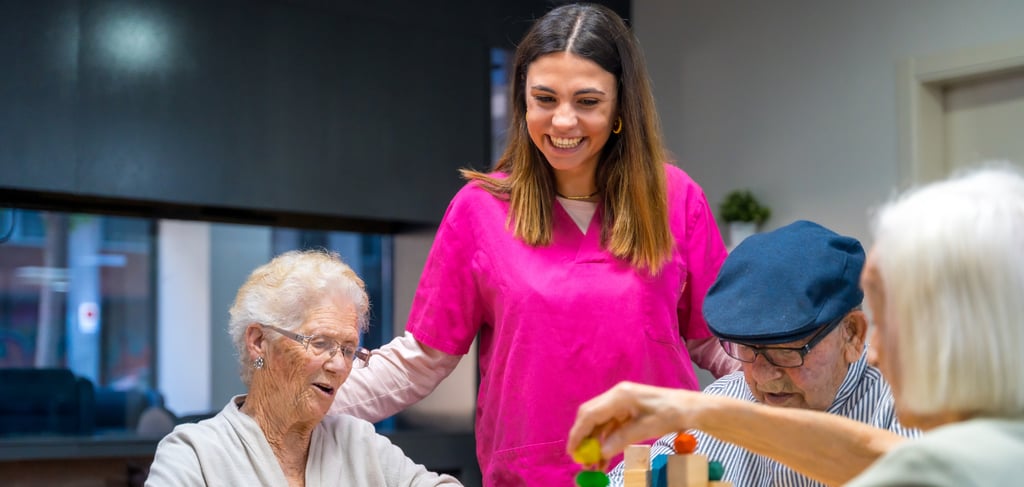When Caregiving Meets Grief: Supporting Clients Through the Loss of a Spouse or Loved One at Home
Homecare isn’t just about physical support — caregivers are often the first to witness deep emotional trauma, especially when seniors lose a spouse or close family member. Yet grief care is rarely discussed in homecare services.
10/17/20254 min read


Understanding Grief Stages in Elderly Clients
Grief is a universal experience, yet its profound manifestations can differ markedly among individuals, particularly in elderly clients. As seniors navigate the loss of a spouse or a loved one, they may encounter the well-documented stages of grief, which include denial, anger, bargaining, depression, and acceptance. Each stage can influence their emotional and psychological wellbeing in distinct ways.
Initially, many elderly individuals may enter a state of denial, where the reality of loss feels overwhelming. This can serve as a protective mechanism, allowing them to gradually process their emotions. In this phase, caregivers should be alert to signs of withdrawal or avoidance behaviors, as these can indicate the client's struggle to acknowledge their new reality.
Following denial, anger may emerge. This stage can manifest through expressions of frustration or irritability, often directed at themselves, others, or even the deceased. Caregivers must approach this phase with empathy and patience, understanding that expressing anger is a normal part of the grieving process and can be a crucial step towards healing.
Bargaining is another stage where individuals may attempt to regain control of their situation or mitigate their perceived loss. In elderly clients, this may involve thoughts about what they could have done differently. Caregivers should provide a compassionate space for seniors to articulate these feelings without minimizing their grief.
As the process continues, depression often sets in, characterized by profound sadness and withdrawal from daily activities. This phase requires vigilance, as caregivers play a pivotal role in encouraging social interactions and facilitating support systems. Lastly, acceptance can emerge, signifying a gradual adjustment to life without the deceased. Understanding these stages equips caregivers to better support elderly clients in their grief journey, ultimately enhancing their emotional resilience and overall wellbeing.
Emotional Signs Caregivers Must Watch For
When providing care for elderly clients, it is crucial for caregivers to remain attentive to subtle emotional signs of grief following the loss of a spouse or loved one. Understanding these red flags enables caregivers to offer appropriate support and ensure the emotional well-being of their clients during such a challenging time.
One prominent indicator of grief that caregivers should watch for is withdrawal from social interaction. Clients who once actively participated in social activities may begin to isolate themselves, avoiding conversations and gatherings. This retreat can signify the overwhelming sadness and longing experienced by those who are grieving. Caregivers should gently encourage communication and remind clients of the support available to them.
Additionally, caregivers must be alert to changes in behavior, particularly a marked silence. When an elderly client suddenly becomes quiet or exhibits a lack of interest in conversations, it could indicate an internal struggle with their feelings of loss. It is essential for caregivers to foster an open environment, allowing clients to express their emotions without judgment.
Agitation can also serve as a significant emotional sign of grief. Clients may display increased irritability or frustration as they grapple with their emotions. Caregivers can create a calming atmosphere through reassurance and patience, helping clients navigate their distress without feeling overwhelmed.
Lastly, alterations in appetite or sleep patterns often accompany grief. A client may eat significantly less or experience insomnia, which may exacerbate their emotional state. Monitoring these changes equips caregivers to address potential health concerns while offering support and understanding. Encouraging a balanced diet and establishing a bedtime routine can help mitigate these challenges.
By recognizing these subtle yet meaningful emotional signs of grief, caregivers can provide critical support to clients, easing their journey through the grieving process.
Gentle Ways Caregivers Can Provide Comfort and Routine
The role of caregivers extends beyond physical assistance; they serve as emotional anchors in periods of profound loss. To provide comfort to clients grieving the death of a spouse or loved one, caregivers should consider implementing gentle strategies designed to foster emotional healing and maintain a sense of normalcy. Establishing a consistent routine is critical as it creates stability. Predictable daily schedules can help clients feel secure, allowing them to navigate their grief more effectively.
One effective strategy involves active listening. Caregivers can create a safe space for clients to express their thoughts and feelings regarding their loss. By genuinely engaging in conversations, caregivers show that the clients' stories are valued, promoting catharsis and connection. Encouraging storytelling about the deceased can also be beneficial. This act not only honors the memory of the loved one but allows clients to process their grief in a supportive environment.
In addition to emotional support, caregivers can introduce engaging activities that focus on holistic care approaches. Art and music therapy are excellent avenues for nurturing emotional healing. Creative endeavors allow clients to express themselves in ways that words may fail to capture. Providing art supplies for drawing, painting, or crafting can facilitate self-expression, while music can evoke memories and emotions that aid in the grieving process. Furthermore, approaching care with compassion and understanding can instill a sense of hope during this challenging period.
Ultimately, the integration of established routines, active listening, and engaging activities serves as gentle yet effective ways for caregivers to provide comfort. By creating an environment conducive to emotional expression and stability, caregivers can play a vital role in supporting clients through their journey of grief.
Why Grief Training Should Be Part of Professional Homecare Support
Grief is an inevitable aspect of life, particularly within the context of homecare, where caregivers interact closely with clients experiencing loss. Incorporating grief training into professional homecare support is essential for several compelling reasons. Firstly, understanding grief psychology equips caregivers with the knowledge necessary to recognize the various stages and manifestations of grief, which can differ significantly from one individual to another. This awareness allows caregivers to respond appropriately to the emotional needs of their clients.
Moreover, training in grief support techniques enhances caregivers’ ability to provide compassionate care. When caregivers are educated about the emotional landscape of mourning, they can better navigate conversations surrounding loss, offering support that is both meaningful and respectful. This not only nurtures a trusting relationship between caregiver and client but also fosters an environment where clients feel safe to express their emotions without fear of judgment or misunderstanding.
Additionally, the benefits of grief training extend beyond the clients themselves; they also positively impact caregiver confidence. When caregivers are well-versed in grief support, they are more prepared to handle complex emotional situations. This preparedness leads to greater job satisfaction, reduced stress, and a lower likelihood of caregiver burnout, ultimately improving the quality of care provided to clients. In turn, improved care can lead to better client outcomes—clients who feel understood and supported are more likely to experience a smoother grieving process.
In essence, integrating grief training into homecare services cultivates a more empathetic care environment that recognizes and addresses the unique emotional challenges posed by loss. Educated caregivers not only enhance the support offered to clients but ensure that the overall care experience is compassionate and holistic. This comprehensive approach to grief support in caregiving can have lasting positive effects on both clients and caregivers alike.


